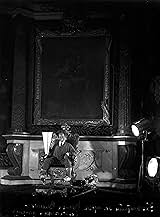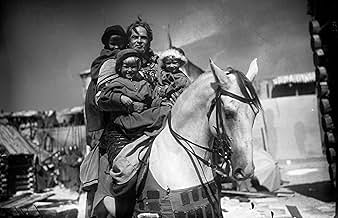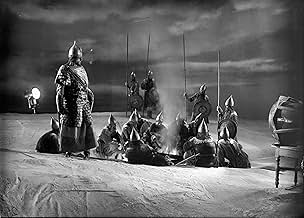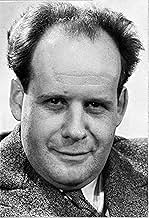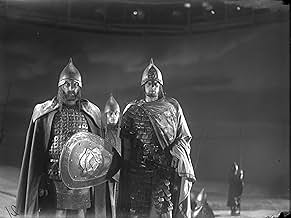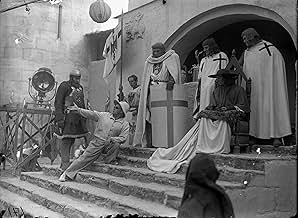IMDb रेटिंग
7.5/10
13 हज़ार
आपकी रेटिंग
अपनी भाषा में प्लॉट जोड़ेंThe story of how a great Russian prince led a ragtag army to battle an invading force of Teutonic Knights.The story of how a great Russian prince led a ragtag army to battle an invading force of Teutonic Knights.The story of how a great Russian prince led a ragtag army to battle an invading force of Teutonic Knights.
- निर्देशक
- लेखक
- स्टार
- पुरस्कार
- कुल 2 जीत
Nikolay Cherkasov
- Aleksandr Nevsky
- (as N. Cherkasov)
Nikolai Okhlopkov
- Vasili Buslai
- (as N. Okhlopkov)
Andrei Abrikosov
- Gavrilo Oleksich
- (as A. Abrikosov)
Dmitriy Orlov
- Ignat - the Master Armorer
- (as D. Orlov)
Vasili Novikov
- Pavsha - Governor of Pskov
- (as V. Novikov)
Nikolai Arsky
- Domash Tverdislavich - a Novgorod Boyar
- (as N. Arsky)
Varvara Massalitinova
- Amelfa Timoferevna - Buslai's Mother
- (as V. Massalitova)
Valentina Ivashova
- Olga Danilovna - a Maid of Novgorod
- (as V. Ivashova)
Aleksandra Danilova
- Vasilisa - a Maid of Pskov
- (as A. Danilova)
Sergei Blinnikov
- Tverdilo - Traitorous Mayor of Pskov
- (as S. Blinnikov)
Ivan Lagutin
- Anani - a Monk
- (as I. Lagutin)
Lev Fenin
- The Archbishop
- (as L. Fenin)
Naum Rogozhin
- The Black-Hooded Monk
- (as N. Rogozhin)
Nikolai Aparin
- Mikhalka
- (बिना क्रेडिट के)
Boris Belyakov
- Rytsar
- (बिना क्रेडिट के)
A. Gulkovski
- Teutonic Knight
- (बिना क्रेडिट के)
Avenir Gulkovskiy
- rytsar Tevtonskogo ordena
- (बिना क्रेडिट के)
फ़ीचर्ड समीक्षाएं
Alexander Nevsky (1938) is a brilliant piece of cinematic propaganda. The people of Russia are threatened by two major enemies, the Mongols and the Teutonic Knights of the Holy Roman Empire. In ordered to unite the warring, rival Princes in the Russian Realm, Nevsky takes charge and fights the lesser of two evils (The Teutonics). This influential film was copied many times over and it still holds up to this day. The soundtrack by composer Prokiev and Eisentstein's direction are a sight and sound to behold Many years later, John Milius used many of the movies scenes, set pieces and costumes from this film and incorporated them into Conan.
One of my favorite lines from Conan was taken from this movie. "It's not the strength of the iron in a weapon but the strength of the person that wields it is what matters." The comparisons are unmistakable. The armor that James Earl Jones and the Leader of the Teutonic Knights wear are virtually identical. A true tribute paid from one director to another.
I give Alexander Nevsky one of my highest recommendations. The movie plays like the final Act of Richard III. The presence of Prince Alexander on the screen is truly amazing.
One of my favorite lines from Conan was taken from this movie. "It's not the strength of the iron in a weapon but the strength of the person that wields it is what matters." The comparisons are unmistakable. The armor that James Earl Jones and the Leader of the Teutonic Knights wear are virtually identical. A true tribute paid from one director to another.
I give Alexander Nevsky one of my highest recommendations. The movie plays like the final Act of Richard III. The presence of Prince Alexander on the screen is truly amazing.
10halsmith
There is a version of "Nevsky" that is shown with a live symphony orchestra, chorus, soloist and the movie. If it's EVER performed within a day's travel of you see "Nevsky" done that way. The Oklahoma City Philharmonic did it with the OKC Canterbury Choir (one of the finest anywhere) a couple of years ago. I think I cried through the whole thing, it was one of the most emotionally powerful movie experiences of my life. I'm listening to "Nevsky" on the radio right now and it still tears me up. There are movies that I love, and classical music pieces I love, but there is no combination I can think of that comes close to the impact of "Nevsky" performed in real time.
Eisenstein's "Alexander Nevsky" was made mostly for propaganda purposes in 1938. It was a reminder to all Russians of their dastardly neighbors (the Nazis) to their west. The film plays on this comparison and several others to a lesser degree. The evil Germanic Teutonic Knights just happen to be of the Christian faith and their religious leaders make for very effective villians. Although Nikolai Cherkasov as Nevsky and Nikolai Okhlopkov as his right-hand man, Vasili, are commanding in their roles, this movie is mainly noted for the final climactic battle between good (the Russians) and pure evil (the Germans). Eisenstein purposely covers the Germans with over-sized helmets so that they're totally devoid of any human facial expressions. On the contrary, the Russian peasants who comprise most of Nevsky's army are portrayed with a variety of emotions and their humanity is not only recognizable but refreshing and appealing to the viewer. When the Teutonic Knights make their charge on the Russian position, the action is fast and furious and it would be difficult to find any other film which stages its action scenes as well as Eisenstein does here. Although a bit dated in the print that I saw (the sound was certainly a bit off) this movie is a must-see for anyone interested in foreign films and especially the Russian cinema during the days of Stalin. The Germans might have thought twice about attacking Russia in 1941 if they had seen this film beforehand. The message was clear back then. In the words of Alexander Nevsky himself: "Do not enter Russia with a sword in your hand." Well, you can't say they weren't warned.
Sergei Eisenstein's "Alexander Nevsky" is a biopic of the famous prince, but when released it was seen as an expression of the growing suspicion of Nazi Germany. Indeed, the battle scenes make the Teutonic Knights - aka the Germans - get depicted as faceless goons who have no qualms about killing anyone. The epic battle scene is probably the most well remembered scene in the movie. It basically says "If you invade Russia, expect the same fate as befell the Teutonic Knights." Hitler didn't heed the warning, and his hoped-for thousand-year Reich only lasted twelve years (the harsh winters didn't help matters).
Understanding that it's a form of propaganda, it's an impressive movie. I wouldn't expect otherwise from Eisenstein. If you're going to teach a course on Russian cinema, you would have to include this one. Excellent movie.
Understanding that it's a form of propaganda, it's an impressive movie. I wouldn't expect otherwise from Eisenstein. If you're going to teach a course on Russian cinema, you would have to include this one. Excellent movie.
In 1242, Russia in being invaded by two sides: from the orient by the Mongols and from Europe side, by the Germans Teutonic Knights of the Holy Roman Empire. The city of Novgorod is the last free city in Russia. The population, in order to organize the defense of Novgorod and the lands of Russia, calls the Prince Aleksandr Nevsky, who had defeated the Swedish in a previous battle. His successful strategy defeats the Germans, after a great battle on a frozen lake. This movie was made in 1938 due to the threaten of the German to Russia, in a pre-Second World War period. The idea was to make propaganda pro-Russia. However, it is an overwhelming, marvelous, stunning powerful masterpiece. It is amazing the combat scene on the frozen lake. The present generation is very accustomed to special effects, like in the `Lord of the Rings' trilogy, and maybe cannot understand how fantastic is this black and white fight. If the viewer can forget the ideology and watch it as an art, he will certainly be astonished in the end with such a masterpiece. My vote is ten.
Title (Brazil): Alexander Nevsky
Title (Brazil): Alexander Nevsky
क्या आपको पता है
- ट्रिवियाJoseph Stalin wanted this film to be a propaganda tool to warn Soviet citizens to be wary of German aggression. However, it was rejected at first due to it being "too anti-German", as it came out shortly before the Soviet-German non-aggression pact of 1939 was signed. In 1941, the peace was broken and Stalin reportedly demanded that it be shown in every Soviet movie theater as a rallying cry against the invasion.
- गूफ़Gavrila Alexich, one of the movie's main protagonists, could not participate in the Battle of Ice. He was killed one year before it, in 1241, storming the fortress of Koporye.
- भाव
Alexandr Nevsky: Go tell all in foreign lands that Russia lives! Those who come to us in peace will be welcome as a guest. But those who come to us sword in hand will die by the sword! On that Russia stands and forever will we stand!
- क्रेज़ी क्रेडिटBefore the word "End" appears Alexandr Nevsky's famous quote "But those who come to us sword in hand will die by the sword! On that Russia stands and forever will we stand!" appears on the screen, right after Nevsky said it in the movie.
- इसके अलावा अन्य वर्जनA new edition appeared on video in 1995 with the entire Prokofiev score newly recorded in hi-fi stereo, using the same 1938 orchestrations and perfectly synchronized to the original 1938 dialogue and sound effects tracks, so that it is now possible to see and hear the film exactly as it always was, with the exception being that the music is now heard in hi-fi sound, rather than the tinny 1938 recording.
टॉप पसंद
रेटिंग देने के लिए साइन-इन करें और वैयक्तिकृत सुझावों के लिए वॉचलिस्ट करें
- How long is Alexander Nevsky?Alexa द्वारा संचालित
विवरण
बॉक्स ऑफ़िस
- दुनिया भर में सकल
- $2,226
- चलने की अवधि1 घंटा 52 मिनट
- रंग
- ध्वनि मिश्रण
- पक्ष अनुपात
- 1.37 : 1
इस पेज में योगदान दें
किसी बदलाव का सुझाव दें या अनुपलब्ध कॉन्टेंट जोड़ें


